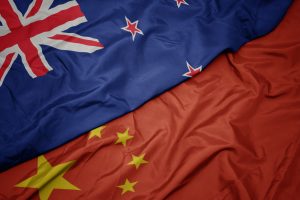In April 2021, New Zealand Foreign Minister Nanaia Mahuta likened the New Zealand-China relationship to “the respect a Taniwha would have for a Dragon and vice versa.”
Mahuta’s speech was one of the more recent attempts to articulate the complicated and delicate nature of the bilateral relationship between China and New Zealand. The small Pacific nation leans heavily on China as its largest trading partner, but simultaneously feels an obligation to stand up for the rules-based international order in the face of China’s growing assertiveness.
The foreign minister’s Dragon-Taniwha metaphor left a lot of room for interpretation on practical concerns, including the level of investment New Zealand is willing to accept directly from the Chinese government. Or, in keeping with the metaphor, the extent to which the Dragon should “feed” the Taniwha.
This question was put directly to New Zealand politicians recently. Most enthusiastic about the prospect was Opposition Leader Christopher Luxon. The National Party leader was asked if he was open to direct Chinese government investment to partially fund his NZ$26 billion road infrastructure policy, through the Chinese Communist Party’s Belt and Road Initiative (BRI). The opposition leader replied he “absolutely” was.
Importantly, Chinese investment in New Zealand is not a new phenomenon. “China (including Hong Kong) is among the largest sources of foreign direct investment amounting to NZD $11.46 billion in the year ending March 2022,” according to New Zealand’s Ministry of Foreign Affairs. However, direct investment under the Belt and Road Initiative for infrastructure is not the same.
1News asked Luxon about the potential consequences of Chinese government-funded infrastructure, which in other BRI countries has resulted in an influx of Chinese migrant workers and a high level of debt owed to Beijing. When pressed, Luxon replied, “That’s not going to happen. That’s quite a xenophobic sort of response and a pretty simplistic response.”
Luxon’s competition on the right has a different stance. David Seymour, leader of the economically conservative ACT Party, expressed concerns about China’s alleged debt-trap diplomacy. “[W]e can’t follow the lead of Pacific nations who have accepted investment from China, only to find they’re now in serious debt to a communist regime flexing its muscles,” Seymour said. He sought to create distance between his party and Luxon’s, emphasizing that “If National’s Transport policy leaves the door open for the Chinese Government to build New Zealand roads, ACT’s well thought out Transport policy shuts it.”
It is an election year in New Zealand. Clearly, there is a domestic politicking element to these policy stances on Chinese investment. National leaders are keen to paint the incumbent Labor government as closed-off to foreign investment and uninterested in more creative funding solutions beyond taxation.
National’s Transport Spokesperson Simeon Brown spelled that out for voters when he said, “We’re not going to be closed-minded like this government when it comes to different funding sources to get things done.”
There is no doubt the debate about Chinese investment in New Zealand, especially funding directly from the Chinese government, is a complex one. New Zealand has to consider its relationship to Western partners, the level of debt to a rising regional and global power, the quality of infrastructure, and national security complications.
Concerns regarding national security have become more salient recently, with one of New Zealand’s national security agencies publicly acknowledging the use of foreign interference tactics by the Chinese government on New Zealand soil. The New Zealand Security Intelligence Service (NZSIS) recently released their first public report on New Zealand’s security threat environment.
In their report, the agency notes that foreign interference has included the “continued targeting of New Zealand’s diverse ethnic Chinese communities. We see these activities carried out by groups and individuals linked to the intelligence arm of the People’s Republic of China (PRC).”
The public naming of China (along with Iran and Russia), as conducting foreign interference is unprecedented in New Zealand. Even if the report hides the reality of Chinese foreign interference behind coded diplomatic language, the acknowledgement of its existence publicly is unusual.
As the issue of Chinese investment becomes political ahead of October’s general election, considering potential national security consequences needs to be prioritized over politicking, especially in light of the recent NZSIS report. Doing so is not “xenophobic” or “simplistic,” as Luxon might say. Rather, it is protecting New Zealand’s national security in a region where China is increasingly assertive, including economically.
New Zealand should look for highly trustworthy and transparent investors – two words few would use to describe China. Rushing into accepting investment from the Chinese government seems at odds with an acknowledgement that that same government conducts foreign interference on New Zealand soil.
Luxon has not yet shown how he, or the National Party, can reconcile those two seemingly contradictory positions.

































